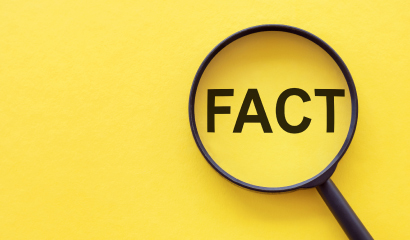
Upon Reflection: Fighting the good fight to ensure that facts cannot be ignored
This column is a periodic series of personal reflections on journalism, news literacy, education and related topics by NLP’s founder and CEO, Alan C. Miller. Columns are posted at 10 a.m. ET every other Thursday.
Ninety years before the jaw-dropping notion of “alternative facts” made its debut on the North Lawn of the White House at the dawn of Donald Trump’s presidency, the British author Aldous Huxley wrote, “Facts do not cease to exist because they are ignored.”
Increasingly, that lesson is lost on far too many Americans. Facts often struggle to be read, seen and heard in a tsunami of misinformation, conspiracy theories and hoaxes. We all need to do our part to keep them front and center.
Among those on the front line of this battle — one that is essential for survival of democracy — are the fact-checkers.
At their best, these dogged practitioners are independent, nonpartisan and scrupulous in their work. They do not ask the public to merely trust their judgment; they are transparent with their sources and the reasons for their ratings. They disclose their funders. They have ethics codes. And when they themselves make a mistake, they acknowledge and correct it.
“We believe nonpartisan and transparent fact-checking can be a powerful instrument of accountability journalism,” states the Code of Principles of the International Fact-Checking Network, based at the Poynter Institute. “Conversely, unsourced or biased fact-checking can increase distrust in the media and experts while polluting public understanding.”
That’s why it’s important for everyone to know the most relevant sources to turn to when looking to check if the latest viral rumor is true, misleading, false or fabricated.
This list, presented in alphabetical order, is not intended to be exhaustive — and for fact-checkers reading this, I ask your forgiveness if you are doing good work and are not included here. I hope this will prove helpful to others who want to know what to trust and to everyone who is committed to giving facts a fighting chance.
- AFP Fact Check. This global fact-checking organization employs journalists and editors around the world to debunk misinformation and other harmful content. Other reputable international sites include Africa Check and Full Fact.
- The Associated Press, The Washington Post, CNN, Reuters, and USA Today. These major news organizations provide timely fact-checking, using a variety of formats. The AP’s Not Real News rundown provides a “look at what didn’t happen this week.” The Washington Post’s Fact Checker uses Pinocchios to rate political and other claims (“mostly true” gets one; “whoppers” earn four). CNN’s Daniel Dale gained renown for his rapid-fire fact checks of presidential debates and other live events. Reuters’ Fact Check unit investigates videos and claims on social media. USA Today has its own Fact Check site.
- BuzzFeed News’ Jane Lytvynenko and Craig Silverman. A well-known fact-checker and debunker, Lytvynenko posts real-time threads on Twitter analyzing false claims and rumors in breaking news situations. Silverman is an award-winning editor and analyst in the misinformation world. He edits the Verification Handbook, a valuable fact-checking resource.
- FactCheck.org. A self-described “consumer advocate” for voters, this site is one of the most prolific in tackling social media viral rumors and hoaxes. It also monitors the accuracy of political statements and information. It is a project of the University of Pennsylvania’s Annenberg Public Policy Center.
- FactStream. This mobile app created by the Duke Reporters’ Lab provides summaries from a group of major fact-checking organizations and custom notifications for new fact checks and ratings. This is a good way to connect to corrective, credible information from a single site.
- First Draft. This verification nonprofit focuses on research and training to fight online misinformation and disinformation. Co-founder Claire Wardle is a well-known expert in this field.
- Lead Stories. This site detects trending stories that are fake or hoaxes and seeks to quickly debunk them. It says it has been fact-checking “at the speed of likes since 2015.”
- PolitiFact. This prominent fact-checking site rates the accuracy of claims by politicians and policymakers. It is best known for its Truth-O-Meter rating (and its extreme “Pants on Fire” designation). Its coverage of the 2008 presidential campaign earned it the Pulitzer Prize for National Reporting.
- Snopes.com. This site got its start debunking urban legends and other rumors in 1994. It describes itself as the oldest and largest online fact-checking site.
- TruthOrFiction.com. This site is designed to help internet users quickly and easily debunk widely circulating hoaxes, rumors and other misinformation. It does fewer posts than others on this list, and its fact checks are often a little deeper and more analytical.
Finally, I would be remiss if I failed to mention a fact-checker with a narrower lens: HoaxEye (Janne Ahlberg), whose Twitter feed focuses on images that have been manipulated or are taken out of context. People frequently “tag” @hoaxeye in comments under tweets that contain dubious or too-good-to-be-true photos and video. As HoaxEye notes in its metadata, “A fake image is worth zero words.”
Read more from this series:
- Apr. 22: Spotlight — a special resonance
- Apr. 8: The 19th* — a nonprofit news startup made for the moment
- Mar. 25: How I became a ‘pinhead’ — a news literacy lesson
- Feb. 26: Students’ enduring rights to freedoms of speech and the press
- Feb. 11: We need news literacy education to bolster democracy
- Jan 28: 13 lessons from our first 13 years
- Jan. 14: Media needs to get COVID-19 vaccine story right
- Dec. 17: Journalism’s real ‘fake news’ problem also reflects its accountability
- Dec. 3: Combating America’s alternative realities before it’s too late
- Nov. 12: “Kind of a miracle,” kind of a mess, and the case for election reform
- Oct. 29: High stakes for calling the election
- Oct. 15: In praise of investigative reporting
- Oct. 1: How to spot and avoid spreading fake news
